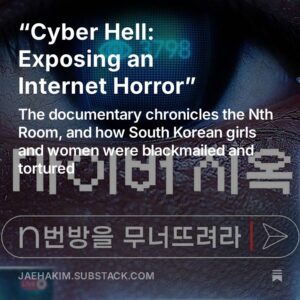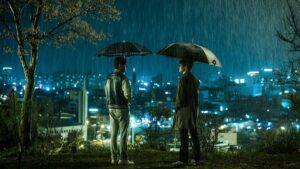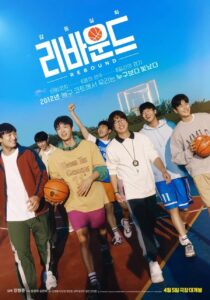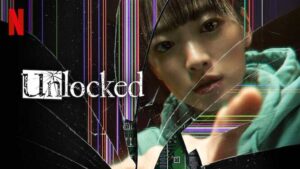“Bogotá: City of the Lost” (보고타: 마지막 기회의 땅)

There is a lot going on in “Bogotá: City of the Lost” — shootings, explosions, backstabbing. But when it’s all over, you realize that it was mostly much ado about nothing.
Journalist, Author & Syndicated Columnist

There is a lot going on in “Bogotá: City of the Lost” — shootings, explosions, backstabbing. But when it’s all over, you realize that it was mostly much ado about nothing.

An interview with the Korean German actor on why he joined the cast of “The Recruit”

“Officer Black Belt” is an action-packed thriller starring Kim Woo-bin. Is it predictable? Yes? But is it a fun watch? Absolutely!

The Nth Room targeted Korean women in a lower socio-economic class who needed money. They also set their marks on underage girls, who were too young to handle what they had been tricked into. These crimes are continuing, but now with with teenage boys at the helm.

In the Academy Award-nominated film “Past Lives,” the Korean concept of inyeon is used to lead viewers into believing that Nora (Greta Lee) and Hae-sung (Teo Yoo) are destined to be together – if not in this lifetime, then in the future. Or perhaps they were together in a distant past that neither can recall. The introduction of the word leaves moviegoers hoping that these two can have a happily-ever-after ending, despite his living in Seoul, 7,000 miles from her apartment in New York City.

Kang Ha-neul stars in “Forgotten,” a film that tackles murder, memory loss, and mayhem in a clever way with lots of twists and turns that keep viewers intrigued. It centers on two brothers, neither of whom are as they seem, and a tragedy that ties them together. Written and deftly directed by Jang Hang-jun, it’s an enjoyable movie with a what happened now?!! ending that offers closure for both the characters and the audience.

Sang-hwan is a police officer who is too much of a ‘fraidy cat to be a standout on the force. But through his friendship with Eui-jin, who has extraordinary fighting skills, he learns that he has untapped super powers of his own.

If you watched Sylvester Stallone’s 1987 arm wrestling film “Over the Top” and hated it, don’t let that deter you from giving “Champion” a shot. Starring Ma Dong-seok (“Train to Busan,” “Eternals,” “The Roundup” films), the buff actor has a knack for comedy.

Based on the real-life Homeless World Cup (which was held in September in Seoul), “Dream” offers a more cynical look than Great Britain’s “The Beautiful Game,” which shares the same topic.

“#Alive” was filmed a year before countries worldwide were locking down due to the COVID-19 pandemic. But its depiction of isolation and fear of the unknown mirrors what millions of people went through (minus the zombies) in this 2020 thriller.

“The Gangster, The Cop, The Devil” is not a good film, but it’s watchable because its star is Ma Dong-seok. The burly actor stars as a mob boss whose street credibility takes a beating when he is nearly killed by a floppy-haired serial killer (Kim Sung-kyu) — whose modus operandi is rear-ending drivers and then savagely stabbing them to death.

After learning that his long-time girlfriend is deathly allergic to dogs, Min-soo sets out on a journey to to find a new home for his beloved golden retriever. In the end, he realizes that the solution to his problem was nearby the whole time.

“Rebound” is based on the true story of Busan’s Jungang High School basketball team. Long past its glory years, the team isn’t a priority for the school’s administration. They hire a young and inexperienced basketball coach, Yang-hyun (Ahn Jae-hong), who during his own Jungang school days was a champion athlete.

A thoroughly entertaining cop-buddy film, “Midnight Runners” does a great job of blending comedy with action, while delving into the world of human trafficking and organ harvesting. The film is driven by the camaraderie between musclehead Ki-joon (Park Seo-joon) and nerdy by-the-book Hee-yeol (Kan Ha-neul).

A fast-moving action film, “Yaksha: Ruthless Operations” is a spy thriller full of special ops, backstabbing and political intrigue. Last year, I stopped watching about 20 minutes into the movie, because it didn’t hold my interest. But when I went back to it this year, I found it to be thoroughly entertaining. Is this a prestige film? Absolutely not. But it was a fun ride with a (straight-laced) fish-out-of-water concept.

“Unlocked” came out a few months after the Korean series “Somebody.” Both revolve around cunning, good-looking serial killers who utilize technology to hack their way into their victims’ lives. In this 2022 film, the cell phone is the device of choice.

“It’s my dream to travel around the world and play with local musicians playing their traditional instruments,” Suga says in his documentary Suga: Road to D-Day. “It’s my dream to record them and make music based on that.” But he has trepidation, too. “I worry that I won’t have anything to talk about,” Suga says. “I have fears that I have no more dreams to follow.”

In an unusual cinematic coincidence, two critically acclaimed films about South Korean adoption were released in December depicting different sides of the adoption story. Broker focuses on a teenage girl who leaves her infant at a church’s safe haven baby box, while Return to Seoul tells the story of a French woman who reunites with her birth family just days after arriving in Korea. To better understand how these films speak to real-life adoptees, I talked to Korean academics, human rights experts, and adoptees. My reported piece for MASHABLE.

“Midnight” is a fast-paced thriller that hits all the jump scares: A mother and daughter who cannot hear or speak are stalked by an insatiable serial killer. The film is a testament to the strength of the powerless and their will to survive.